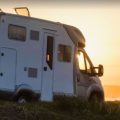Hey! This site is reader-supported and we earn commissions if you purchase products from retailers after clicking on a link from our site.
Crossing a border in an RV can always be an issue. There are numerous issues that will prevent a successful crossing and while some of them may seem frivolous to you as a traveler from the United States, the authorities in other countries take those mandates very seriously. For example, years ago when I was working as an over the road truck driver, I was dispatched to deliver a load of frozen orange juice concentrate from central Florida to a location near Toronto, Canada.
As I was crossing the border into Canada, the Canadian authorities asked me if I had any meat products on board. I showed them my bill of lading that clearly showed I was carrying frozen orange juice concentrate and then they asked me more questions.
“Anything in your cab?”, they asked. “Do you have any food or beverages with you?”
“I’ve got a meatloaf sandwich and a Michigan honey crisp apple”, I replied.
Their response? “We’re going to need you to pull your rig into our clearance area.”
Two hours later they had successfully confiscated my meatloaf sandwich, an apple from Michigan and a fresh grapefruit and orange that I purchased in Florida. The confiscation of the orange from Florida seemed especially odd to me since I was hauling 40,000 lbs. of frozen orange pulp that came from the same place as the orange I bought at Winn-Dixie before I left Florida.
Here’s the deal…you’re coming into their country and it’s up to you to understand the rules. I certainly didn’t know about the do’s and don’ts of what I could bring into Canada in my lunch box, but I should have. My ignorance cost me over two hours of time and I never made that mistake again.
Have the proper identification
Thirty years ago, crossing the border to Canada was much easier than today. In my youth as a young man living in Michigan, our legal drinking age was 21. In Canada it was 19 so it was common for a group of us to pile into a car to go to the clubs just across the border. On weekends many Canadian border towns were flooded with drunken college students from the United States and it was a thriving business for them.
Back then we only needed a drivers license or some other form of official identification. They routinely accepted paper birth certificates with no photo I.D. Today, it’s best to have a passport as that is quickly becoming the only way to travel between countries and it is the most widely recognized.
If you’re driving in their country, you will need a valid license. Make sure you check that your license is valid and there are no suspensions or restrictions on your driving privileges. Something as simply as an unpaid ticket from years ago can put a hold on your license and you could be denied entry. Your past driving record can be an issue as well. I have met several people that were denied entry because they had a DUI conviction on their record. Also, if you’ve got any type of criminal activity on your record, chances are good that you won’t be allowed to enter Canada. You would be well advised to consult the Canada Border Services Agency (CBSA) if you have any of these issues before you try crossing into their country.
Can I cross the border with firearms?
We as American citizens have a right to carry firearms in some states openly, and own them in all states, but those rights end when you’re crossing into Canada or Mexico and you as a responsible RVer should understand that. As a rule, crossing into Canada or Mexico with firearms is strictly prohibited. There are exceptions of course, many people like to hunt, but you will have to apply for a permit well in advance to bring these types of firearms with you and you need to plan for that. You’ll also have to pay a fee. This process can take some time. However, never show up at the border with undeclared firearms.
Can I cross the border with food and beverages?
The best answer here is yes and no. Most fresh fruit and vegetables will be confiscated or not allowed. Meat, poultry and dairy products will be scrutinized as well. As a rule, most canned goods and dry products are acceptable as are beverages such as soda or canned and bottled juices but you’ll need to be mindful of the amount of beer, wine or spirits you can bring into the country. 24 cans or bottles of the 12-once size is the maximum, two 750 ml bottles of wine and one 1.14 liters of liquor (basically one fifth). If you’re a tobacco user, one carton of cigarettes or 50 cigars are allowed.
Can I bring my pets?
Dogs and cats are generally accepted but you must have proof of current rabies vaccinations. If they are under three months old and are not yet eligible for vaccinations, be prepared to have proof of their exact age. For more exotic pets such as birds, reptiles of ferrets, contact the CBSA.
Related: RV pet travel guide
What about prescription medication?
Yes, but be prepared to show the prescription. In other words, if you’re one of those people that use those day-by-day containers to dispense your medicine, so you don’t overlook a daily dosage of one pill or another, you’ll need proof of what they are. When crossing the border, it’s best to have all your medication in the original packaging. It’s also a good idea to have a note from your doctor as to what has been prescribed in case you lose your medication on hand.
What will they ask me when I’m crossing the border?
Questions can vary anywhere from why you are coming there, where are you from and whether you have the proper vehicle registration and insurance. The most commonly ask questions include these:
- Do you have any firearms?
- What is the purpose for your visit?
- How long do you plan to stay and where will you be staying? You don’t need to lay out your whole itinerary for them as over answering a question can throw up red flags for border patrol agents, but it would be best to have a plan of destinations in mind before you arrive.
- Where do you live? This is another one of those red flag questions they ask. If you’re a full-time RVer, it’s best to not try to explain that to them. Tell them the location listed on your passport or drivers license and leave it at that. If they have further questions, then answer them truthfully.
- Do you have any alcohol with you? If you do, tell them the truth. They will most likely inspect your vehicle for the amount you have and if it’s over their allowed amounts, it’s likely that it will be confiscated, or some sort of duty will be charged.
- Is anyone traveling with you? Never take someone across a border that you don’t know. That person you met at a campground last night or last week may seem like a nice person, but if you don’t truly know them, it’s best not to let them cross a border with you.
- Do you have any pets on board? Again, make sure your pets are up to date on their vaccinations and make sure you can prove that.
Some tips for crossing the border without any issues
Be prepared for anything and stay in the lane that your vehicle is directed toward. You should always make sure that you have all the pertinent paperwork regarding your citizenship, vehicle registration and insurance. Keep in mind that while the vehicle insurance you purchased in the U.S. may be valid in Canada, it’s probably not in Mexico and you’ll need to prove to those authorities that you have purchased the proper policies to legally travel through their country.
Always answer questions directly and truthfully. These people are trained to look for deception, so things like not making eye contact or wearing deceptive clothing or sunglasses can alarm them. Also, turn your cell phones, GoPro cameras and any other recording devices off. While it’s true that recording devices can protect you, often authorities in other places (especially southern borders) will be suspicious of your motives and it’s likely your visit to their crossing will be extended or even denied.
The best advice I can give you when crossing any border is to not be deceptive. If you’ve made some mistake about something as simple as bringing in too much alcohol, just apologize and ask them what to do to rectify the situation. Be polite and be nice. Be an American and set an example.
As always, my friends, thanks for traveling along on these incredible life journeys, and I hope to see you out on the highways and byways someday.





